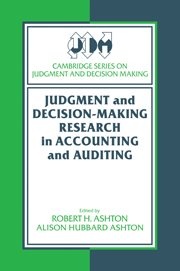Book contents
- Frontmatter
- Contents
- Contributors
- Series Preface
- Preface
- Acknowledgments
- Part I Overview
- Part II Judgment and decision-making research involving users of accounting information
- 2 Decision-making research in managerial accounting: Return to behavioral-economics foundations
- 3 Experimental incentive-contracting research in management accounting
- 4 Judgment and decision-making research in financial accounting: A review and analysis
- 5 The individual versus the aggregate
- Part III Judgment and decision-making research involving auditors of accounting information
- Part IV Conclusion
- References
- Index
3 - Experimental incentive-contracting research in management accounting
Published online by Cambridge University Press: 03 May 2010
- Frontmatter
- Contents
- Contributors
- Series Preface
- Preface
- Acknowledgments
- Part I Overview
- Part II Judgment and decision-making research involving users of accounting information
- 2 Decision-making research in managerial accounting: Return to behavioral-economics foundations
- 3 Experimental incentive-contracting research in management accounting
- 4 Judgment and decision-making research in financial accounting: A review and analysis
- 5 The individual versus the aggregate
- Part III Judgment and decision-making research involving auditors of accounting information
- Part IV Conclusion
- References
- Index
Summary
Introduction
Research on the effects of incentives on judgment and decision making has been conducted in a variety of contexts including memory and attention (Craik and Tulving, 1975; Nilsson, 1987), judgment (Arkes et al., 1986; Wright and Aboul–Ezz, 1988; Camerer, 1987), choice (Grether and Plott, 1979), learning (Hogarth et al., 1991), and goal setting (Locke and Latham, 1990). The questions addressed by experimental research in management accounting on incentives are most closely related to those studied in the goal–setting literature. However, management accounting research differs from the goalsetting literature in experimental contexts and the types of incentives studied.
Research in management accounting centers primarily on how incentives affect decisions made by employees (usually subordinates) within control systems (see Waller, Chapter 2, for discussion of a wider range of decisions within the management accounting domain). A control system consists of a work standard or series of work standards against which employees are evaluated (Hopwood, 1976; Lawler and Rhode, 1976). For instance, in manufacturing contexts, production is broken down into specific work standards such as the number of units of product that an individual or division produces. Once the task is performed, feedback is provided to suggest reasons why performance occurred at a particular level and the ways in which it can be improved. Often incentives are tied to standard attainment to provide motivation and to reduce the amount of feedback required to affect behavior.
- Type
- Chapter
- Information
- Publisher: Cambridge University PressPrint publication year: 1995
- 28
- Cited by



